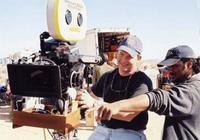Canister of Film

It is the day before production begins. Today we went to Kodak to pick up the film. Sharat and I stopped inside the office first to thank Candace, the woman who decided to give us our film stock at almost half the price. I met her for the first time and shook her hand. “This film is four years in the making. Thank you so much for making this possible.”
We have come this far because of people like her. People who helped us for no other reason than their belief in this film and its message.
Our crew is like that. They are working without pay for 12-hour days through the summer. While Sharat and I picked up the film, Matt Blute, our cinematographer, was at Panavision, testing the 16mm camera they donated for the film’s principal photography. (The picture shows Sharat and Matt standing behind a camera filming AMERICAN MADE). We had to hurry back with the cannisters of film, so that he could test one of them.
In the car, I held one of the bright yellow Kodak boxes in my lap. I opened the box and looked down at the five canisters. I held one in my hands. It was solid and heavy. I liked feeling the weight of it. Brown tape sealed the canister shut to block out any light. The glue of the tape smelled sweet and musty. “Whatever you do, don’t eat it!” Sharat was watching me hold the film to my nose.
It’s true, I was mesmerized. So this is what movies are made on. Real film. For theaters.
I’m sure that directors don’t pick up their own film when they make it big-time, and I have now decided that this is a real shame. We had been working around the clock, losing sleep, preparing to begin production tomorrow, and I felt so stressed, I was losing sight of the forest for the trees. But holding that single cannister of film brought me clarity.
“This film will capture people’s faces,” I thought. “This film will hold the stories that need to be seen.”
As I listened to news on the car radio, hearing only hints of the very real backlash taking place against Sikhs and Muslims in the UK at this very moment, I began to believe that storytelling is a matter of life and death. When we cannot tell our stories, we are not recognized. And without recognition– without being seen and heard for who we really are, especially when we are suffering– I think we enter a living death. Or at least a life without dignity.
Many people in the world experience such a life. Without full rights. Or recognition. Including Sikh and Muslim and Arab communities in America and the UK after terorist attacks. These attacks instill such fear in people that it blinds them to the faces of their neighbors. This is how the terrorists win.
So this cannister of film is a precious life-giving thing, worth more than gold. It holds our stories and carries them to the big screen, one of the best mediums for recognition. Finally it is in our hands. It is time to tell our own stories ourselves.
Production begins tomorrow. In Los Angeles.
Support the film at www.dwf-film.com

